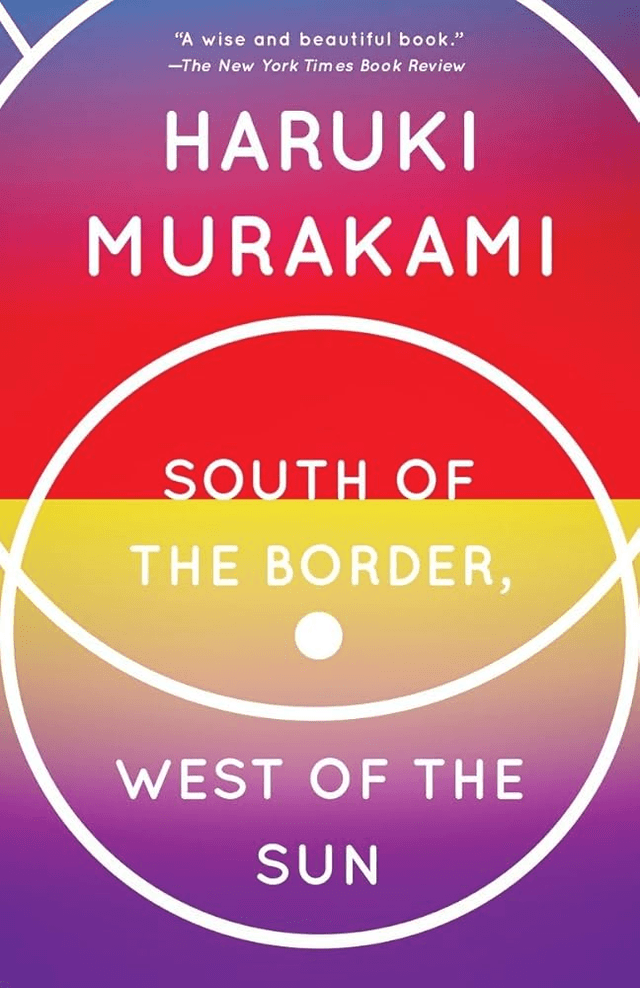South of the Border, West of the Sun vs. What I Talk About When I Talk About Running: A Memoir
South of the Border, West of the Sun
Hajime has arrived at middle age with a loving family and an enviable career, yet he feels incomplete. When a childhood friend, now a beautiful woman, shows up with a secret from which she is unable to escape, the fault lines of doubt in Hajime’s quotidian existence begin to give way. Rich, mysterious, and quietly dazzling, in South of the Border, West of the Sun the simple arc of one man’s life becomes the exquisite literary terrain of Murakami’s remarkable genius.
What I Talk About When I Talk About Running: A Memoir
While training for the New York City Marathon, Haruki Murakami decided to keep a journal of his progress. The result is a memoir about his intertwined obsessions with running and writing, full of vivid recollections and insights, including the eureka moment when he decided to become a writer. By turns funny and sobering, playful and philosophical, here is a rich and revelatory work that elevates the human need for motion to an art form.


Reviews
Reviews
| Item | Votes | Upvote |
|---|---|---|
| Thoughtful exploration of memory and desire | 1 | |
| Engaging, well-developed characters | 1 |
| Item | Votes | Upvote |
|---|---|---|
| Slow-paced narrative | 1 | |
| Ambiguous ending | 1 | |
| Limited action, heavy on introspection | 1 |
| Item | Votes | Upvote |
|---|---|---|
| Easy read | 1 | |
| Learn how Murakami thinks about work, life and running | 1 | |
| Inspires you to run | 1 | |
| Inspires you to do your best work | 1 | |
| Murakami's reflections on aging | 1 |
| Item | Votes | Upvote |
|---|---|---|
| No cons yet, would you like to add one? | ||
Frequently Asked Questions
'South of the Border, West of the Sun' and 'What I Talk About When I Talk About Running: A Memoir' cater to different reader preferences. 'South of the Border, West of the Sun' is a novel that offers a thoughtful exploration of memory and desire, with well-developed characters but a slow-paced narrative and an ambiguous ending. 'What I Talk About When I Talk About Running: A Memoir' is a non-fiction memoir that provides insights into Murakami's thoughts on running and writing, and is often inspiring for readers. The choice between the two depends on whether you prefer introspective fiction or motivational non-fiction.
'South of the Border, West of the Sun' offers a more engaging narrative if you enjoy deep character development and exploring themes of memory and desire. However, the narrative is slow-paced and heavy on introspection. On the other hand, 'What I Talk About When I Talk About Running: A Memoir' is an easy read with a more straightforward narrative, focusing on Murakami's personal experiences with running and writing, which some readers may find equally engaging but in a different way.
'What I Talk About When I Talk About Running: A Memoir' provides more insights into Haruki Murakami's personal life. The memoir includes vivid recollections and insights into his intertwined obsessions with running and writing, as well as reflections on aging. In contrast, 'South of the Border, West of the Sun' is a fictional narrative that does not delve into Murakami's personal life.
Both books are introspective, but in different ways. 'South of the Border, West of the Sun' is introspective in its exploration of the protagonist's inner life, memory, and desire. It focuses on the internal conflicts and thoughts of the main character. 'What I Talk About When I Talk About Running: A Memoir' is introspective in its reflections on Murakami's experiences with running and writing, offering personal insights and philosophical thoughts. Your preference for introspection within fiction or non-fiction will determine which book you find more introspective.
'South of the Border, West of the Sun' is a novel by Haruki Murakami that tells the story of Hajime, a man who has reached middle age with a loving family and a successful career, yet feels incomplete. When a childhood friend reappears in his life, bringing with her a secret, his seemingly perfect existence starts to unravel. The book explores themes of memory, desire, and introspection.
Pros of 'South of the Border, West of the Sun' include its thoughtful exploration of memory and desire, as well as engaging and well-developed characters. Cons include a slow-paced narrative, an ambiguous ending, and limited action, with a heavy focus on introspection.
'What I Talk About When I Talk About Running: A Memoir' by Haruki Murakami is a reflective and philosophical memoir that chronicles his experiences training for the New York City Marathon. The book intertwines his obsessions with running and writing, offering vivid recollections and insights, including the pivotal moment when he decided to become a writer. It is by turns funny, sobering, playful, and philosophical, exploring the human need for motion as an art form.
Pros of 'What I Talk About When I Talk About Running: A Memoir' include: it is an easy read, provides insights into how Murakami thinks about work, life, and running, inspires readers to run and do their best work, and includes Murakami's reflections on aging. There are currently no listed cons.
Haruki Murakami is a renowned Japanese author known for his contemporary fiction works that often blend elements of the fantastical with the mundane. His notable books include 'Norwegian Wood,' 'Kafka on the Shore,' and '1Q84.' Murakami is also an avid runner, and his memoir 'What I Talk About When I Talk About Running' reflects his passion for both writing and running.
'What I Talk About When I Talk About Running: A Memoir' explores themes such as the intersection of physical and mental discipline, the pursuit of personal goals, the relationship between running and writing, and reflections on aging. Murakami delves into how running has influenced his writing process and overall outlook on life.
You should read 'What I Talk About When I Talk About Running: A Memoir' if you are interested in personal growth, enjoy reflective and philosophical writing, or are a fan of Haruki Murakami's works. The memoir provides unique insights into Murakami's life, his approach to both running and writing, and offers inspiration to pursue your passions with dedication.













